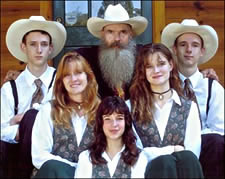
A Conversation
with Sandy Cherryholmes (continued)
PM: When do they get time to practice, Sandy?
SC: Since music is such a big part of their lives, practice is a lot of times something that they do because that's their love.
PM: Yeah.
SC: During downtime. I imagine later on today, when they're done with school, they'll probably get instruments out, and later we'll look at new songs we're working on. We'll practice in the bus as we're going down the road.
PM: Wow. But the bus is kind of an open thing. If the fiddler wants to practice something in the key of A, and the banjo wants to learn something in F, I mean, do they just kind of find a way and point toward the window and practice something they're working on, or go in the bathroom, and just catch as catch can?
SC: They'll go in the bathroom. I was just going to say, the bathroom is the rehearsal room. You'll have someone who's in the bathroom, someone who has shut the doors to the hallway. It's a 45 foot Prevost, so it's got--
PM: Ah.
SC: We just got a bigger bus. So I can go in the bedroom, if I want to play. I can close the door. You'll have someone in the bathroom, someone in the hallway, and a couple people up front. And then we'll practice as a group. The bus is plenty big for all of us to sit in there while Dad is driving. And then he'll make his comments and that, and then he'll at least be familiar with the songs. Then when we land and get to practicing, he'll add the bass. But we'll work out a lot of the arrangement parts apart from that, and then just put it together.
PM: Wow. Have you been approached about doing a movie on the Cherryholmes story, yet?
SC: No. And I hope I'm not for a while.
[laughter]
PM: That's coming. That's coming. That's too good.
SC: I've had a few different people wanting to do documentaries. I know people get enthralled. And it's just hard to have--well, I suppose if there's something that comes up that works sometime--there is an element of it that we would like to be like a normal family, too, and not just be followed around all the time.
PM: As normal as you can be, anyway. [laughs] I mean, living the life you live.
SC: Yeah.
PM: With so much attention coming their way, how do you manage to keep the kids' egos and values in line, and their eye on the ball? I mean, they're just human.
SC: And that is the whole other issue apart from the success, is that everyone is still human. And with facial hair comes moods.
PM: [laughs]
SC: And when kids go through certain ages, they still have certain things, they still--as they grow they have certain issues they deal with. And I guess adults do, too, as we get older, we have our issues as well. And those are things that we just always are working on. We have lots of family talks. We spend lots of time together talking, in general, just about values and life, reputation, egos, working for the team.
Their dad really works with them about their vision for the team, not the self. Because you can have five great people, but if you don't pull it all into a team, that's where the big explosion of energy is. There are a lot of great individual musicians out there, but there are not a lot of really great, great bands. And so he works real hard on them, you know, about being selfless, putting other people before yourself. That's something we try to set by example, by making a lot of sacrifices ourselves, and we're constantly trying to teach them.
PM: And that's really the crux of the whole thing, I mean, the enlightened spirit-driven leadership, that's what's making this thing work.
SC: Well, I think so, and I believe that. Of course, we're Christians who believe that we're following a plan that's been set before us. And if we handle it the right way, and have the right attitudes and do it to the best of our ability, then whatever blessing it brings--we're willing to go home and not do any of it if it wasn't for us, or we're willing to step out and live with no home, and be on the road, and do whatever it is we're led to do. We're really not doing it for gain, we're doing it because we feel we're supposed to do it for whatever reason, and we love it. A lot of people seem to be happy with what we're doing. And I guess it's, to me, like giving the gift to other people that was given to us from Jim and Jesse years ago.
PM: Well, you've been very kind with your time today, Sandy. I appreciate that very much. And I really look forward to having Cherryholmes on the cover of our--well, you won't see it because it's a magazine on the internet.
[laughter]
SC: Nope. I won't get to see it.
PM: But it's a very classy magazine online, with a million hits a month. A lot of people will read our interview today. And I thank you for your generosity of spirit.
SC: Well, thank you for even considering us. We're honored to have the interest. Thank you for taking the time to do that for us.
PM: Oh, it's a fascinating story. I'm tickled to have been some small part in the spreading of the word. And your friends who do look at the internet, you can say, "Hey, we did an interview for Puremusic.com. Tell me how it looked."
SC: Okay. I'll put that down. We usually have a news page where we tell people where we can get different things, and put links and that. So we'll try to do that, too. That's great. Puremusic.com.
PM: Yeah. And love to the family, Sandy. And thank you very much for your time today.
SC: Oh, hey, thank you. And you have a good day.
![]()
[Most of the photographs featured here came from cherryholmesfamilyband.com, and our thanks also to photographers Evan Carl (whose shots we found at blisteredfingers.com) and Darwin Davidson. See more of Darwin's bluegrass photos here, and check out his weekly bluegrass radio show, Bronzewound, webcast from www.weru.org.]
 |
print (pdf) |
| listen to clips | |
| buy the new CD: | |
| here or here | |
| visit their site | |
| puremusic home |